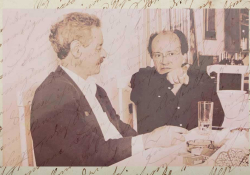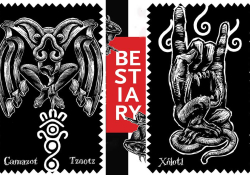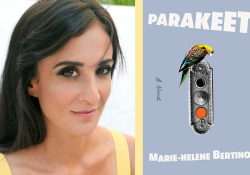Searching for Menarche in Postcolonial Literature: Buchi Emecheta’s The Bride Price

Buchi Emecheta’s novella The Bride Price should play a larger role in world literature classrooms and in spaces in which dialogue about gender is encouraged.
I teach a course on world literature from a two-thousand-page anthology, and in it there is not one mention of menstruation, much less menarche. To supplement the anthology’s dearth of female narratives, I teach Marjane Satrapi’s Persepolis. But even in this graphic novel, though there is a significant discussion of her body changing as she comes of age, the text makes no mention of her menarche or her menstruation. In a full-page panel starting “The Vegetable” chapter, Satrapi draws the protagonist’s transformation from a prepubescent girl into a woman.[i] Somewhere in the midst of this growth of breasts, butt, and body overall must have come Marji’s menarche, but that moment often considered by cultures to be the onset of womanhood is omitted from Marji’s coming of age.
With 2015 being deemed the “year of the period” in the United States, I began to notice the numbers of absent menarches in narratives of girls coming of age in world texts.[ii] Why did these bildungsromans from the postcolonial canon not include the moment where many cultures believe a girl transitions to a woman physically? The most obvious marker of coming of age is absent from the majority of postcolonial texts with female protagonists. I began to pull books off the shelf that I thought must have menarche—or at least menstruation—scenes that I had just forgotten about. I could find four—Nervous Conditions, by Tsitsi Dangarembga; The Bride Price, by Buchi Emecheta; Breath, Eyes, Memory, by Edwidge Danticat; and The Bathhouse, by Farnoosh Moshiri.
The authors of The Curse: A Cultural History of Menstruation note the dearth of menstruation stories in their chapter “Absent Literature: The Menarche.” They find the earliest mentions of menarche in French novels from 1884: Edmond de Goncourt’s Chérie and Emile Zola’s La Joie de Vivre.[iii] When outlining the history of menarche in Western canonical texts, they do not mention any non-Western texts in which menarche seems to be investigated even more rarely. This article calls for a reconsideration of the importance of Buchi Emecheta’s 1976 novel The Bride Price—one of the few postcolonial literary texts that features menarche as a significant theme—and argues that the moment of menarche in it is a turning point that brings an onslaught of pain and distress for Aku-nna, who is coming of age.
The most obvious marker of coming of age is absent from the majority of postcolonial texts with female protagonists.
 In The Bride Price, Aku-nna must leave her more cosmopolitan life in Lagos after her father dies. She returns to her original tribe with her mother and her brother. Though the mother is bucking tradition, she fights to ensure that her daughter will continue her education. Frail in frame, Aku-nna is seen by many members of the tribe as someone who needs protection, and her teacher and soon-to-be lover Chike feels the same way. Her mother foreshadows the novel’s end when she states, “I am not allowing you out of my sight until you are seventeen, or you are bound to die in childbirth. You are so thin and not very developed. All you have are eyes and legs.”[iv] There is much talk about the fact that Aku-nna has not had her first period—to the point where fellow women question her sex and gender—as there is great celebration in the tribe when a girl becomes a woman. On that night suitors may begin to come to the father (or stepfather, in her case) to begin to court the girl and offer a bride price.
In The Bride Price, Aku-nna must leave her more cosmopolitan life in Lagos after her father dies. She returns to her original tribe with her mother and her brother. Though the mother is bucking tradition, she fights to ensure that her daughter will continue her education. Frail in frame, Aku-nna is seen by many members of the tribe as someone who needs protection, and her teacher and soon-to-be lover Chike feels the same way. Her mother foreshadows the novel’s end when she states, “I am not allowing you out of my sight until you are seventeen, or you are bound to die in childbirth. You are so thin and not very developed. All you have are eyes and legs.”[iv] There is much talk about the fact that Aku-nna has not had her first period—to the point where fellow women question her sex and gender—as there is great celebration in the tribe when a girl becomes a woman. On that night suitors may begin to come to the father (or stepfather, in her case) to begin to court the girl and offer a bride price.
At the novel’s midpoint, Aku-nna reaches menarche during school. Before she realizes she will bleed, her teacher Chike admonishes her and she flees to be alone. Chike seeks her out and tells her that he wants her to be happy, that she should return to class. As she walks ahead of him, he cries out “You are bleeding . . . there is blood on your dress.” Immediately, she is afraid: first for her body and then for her psyche:
She swirled round quickly, looked and saw that there was blood smeared on a part of the hem of her dress. At first she was frightened, thinking that she had hurt herself. Then common sense took over, and she knew what was happening to her. She had heard about it from her friends so many times, she had seen it happen to many women, she had been told about it often by her mother and she knew the responsibility that went with it. She was now fully grown. She could be married away, she could be kidnapped, a lock of her hair could be cut by any man to make her his wife forever. (92)
This “it” of the paragraph is the unspeakable: menarche. For Aku-nna, her menarche is not something to be celebrated, as she knows that her entire life is going to change. She realizes “She was now fully grown.” Though she really isn’t—her body is so tiny that it will not be able to sustain a pregnancy at the age of sixteen—she is marriageable now, so she is “grown.” She is afraid of having her period and all that comes with the new burden of being perceived culturally as a woman. She wants to “run, run as far as possible,” but instead she stays, and she and Chike plot to hide her period until she has passed her exams.
Aku-nna feels cramps, pains, and soreness as her first menarche takes place. Her body’s discomfort is mirrored by her psychic discomfort. When she is left alone under a tree, her mind races with questions about her new position in society. She is now at risk—and she has power to hurt the community. With her eyes closed, allowing herself to listen to her psyche, she begins to worry:
What would happen now? Would her people stop her going to school? The only thing she could do was hide it, but how could she? The Ibuza women usually used rags which they changed frequently for freshness and washed several times a day—where would she dry hers without being seen? And when a woman was unclean, she must not go to the stream, she must not enter a household where the man of the family had either the ‘Eze’ or ‘Alo’ title—her uncle Okonkwo had the latter: if she went into such a house, the head of the family would die and the oracle would discover who the culprit was. She might not be killed in broad daylight, but Ibuza people had ways, psychological measures, to eliminate those who committed the abominable alu. (93)
Suddenly the girl-child is gone, and in its place is a “woman” who has the power to kill—and the vulnerability to be destroyed.
Aku-nna quickly moves from material, bodily concerns (where to put her rags) to larger cultural concerns (mobility and community) to psychic concerns (her ability to hurt others and then be destroyed psychologically by the community). Suddenly the girl-child is gone, and in its place is a “woman” who has the power to kill—and the vulnerability to be destroyed. In her community, a woman is mysteriously powerful—hence her better understanding of the cultural implications of her menarche than of its physical aspects—and Aku-nna feels only discomfort and anxiety in the moment of her menarche. With the help of Chike, she works to hide this crucial moment of coming of age from her community, her safety now in the hands of her teacher and suitor.
Chike, a liminal figure, has one foot in the traditional world, which actually is not beneficial to him—his family was composed of slaves, so even though they have achieved high levels of education and work, they are regarded as lower than the rest of the clan. He benefits more from having a foot in the world of the colonizer, and his access to traditional medicine and sanitary products for menstruation gives Aku-nna access to knowledge that allows her to keep her period secret for several months. He also has the mobility to go into town and get Aku-nna the products she needs to keep their secret: “‘You forgot that my brother is a doctor, and I have seen what European women use in these cases. After school, I will go down to Onitsha and buy you a packet. You must hide it, and keep it safe and clean. I shall wrap it up like a book so your mother will not know.” Of course, Chike uses his liminality to help her because has a vested interest in keeping their secret: he wishes her to be his bride, an idea to which she enthusiastically consents. His ability to care for her leads to her realization, “She did not mind belonging to him and being his wealth; she would like to be owned by a man like Chike.”
To ignore menarche in literature is to ignore a milestone in a young girl’s coming of age; such a silence about menarche only reifies the notion that menstruation is something dirty that should be hidden.
But in the same breath, when Chike is no longer with her and the main character is alone, the narrator tells the reader, “She hated herself now. Messy and smelly. She could have stood the messiness but for this horrid backache and her legs going crampy. She felt she would not dare to laugh out loud, or else the blood would gush out.” Aku-nna has a sense of her self that is new and shameful—she is ashamed to be around others, she sees herself as dirty, she sees her ability to laugh overtaken by her body’s new function. The chapter during which all these changes happens is entitled “The Slaves”—referring to both Chike and Aku-nna as she is now a slave to the gender roles conferred upon her at her menarche—and ends with the telling line, “So many things had happened to her in one day, so many things about herself which she did not understand”.
Aku-nna’s menarche begins a chain of events that lead to her death by the end of the novel. Eventually the tribe learns of her period and they have the celebrations (they are not aware that they are not celebrating her first). Because she can now be married, suitors come, but a handicapped classmate’s family kidnaps her and forces her to be his bride. After a successful escape with Chike’s help, the pair begins a life as a “modern” couple living in a town while he works for an oil company. But because she has left in shame, her family will not take a bride price, and the saying has always been that “If the bride price was not paid, she would never survive the birth of her first child.” Aku-nna becomes the exemplar of living in shame—only because she had the audacity to want to choose her partner and dies because of her desire to make her own choices, a desire that begins at the moment of her menarche and her decision to hide it. Her menarche is the beginning of her end. The symbol of her fertility takes away any freedom she may have had, leaving her to live and die at the mercy of other people’s decisions.
Aku-nna’s story and Emecheta’s text deserve more attention—just as menarche itself deserves more attention in literature and its pedagogy. To ignore menarche in literature is to ignore a milestone in a young girl’s coming of age; such a silence about menarche only reifies the notion that menstruation is something dirty that should be hidden. Menarche has serious repercussions for women’s physical and psychic existence, as Aku-nna’s story illustrates. As scholars and teachers, we need to highlight such stories in our work to ensure that we analyze and complicate the concept of menarche.
Kutztown, Pennsylvania
[i] Marjane Satrapi, The Complete Persepolis (Pantheon, 2007).
[ii] Malaka Gharib, “Why 2015 Was the Year of the Period, And We Don’t Mean Punctuation,” NPR, December 31, 2015, accessed May 15, 2016.
[iii] Janice Delaney et al., The Curse: A Cultural History of Menstruation, 2nd ed. (University of Illinois Press, 1988), 171.
[iv] Buchi Emecheta, The Bride Price (George Braziller, 1976), 111.










